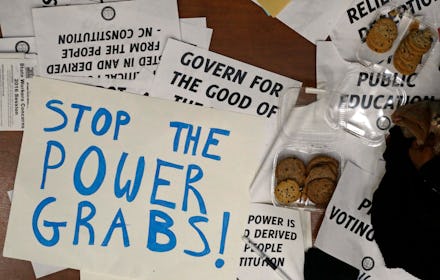North Carolina "can no longer be classified as a full democracy," political scientist says

North Carolina's democratic process has been so compromised by the 2016 election that the state "can no longer be classified as a full democracy" — or so said University of North Carolina political science professor and democratic elections scholar Andrew Reynolds in an op-ed published Thursday in the News and Observer.
In 2012, Reynolds helped develop a system for measuring the integrity of elections that is used by the Electoral Integrity Project, an independent project that measures the fairness of elections in countries around the world.
The latest EIP report gives North Carolina a score of 58 out of 100. If it were an independent nation, North Carolina's score would place it "alongside authoritarian states and pseudo-democracies like Cuba, Indonesia and Sierra Leone," Reynolds pointed out.
On the metric that evaluates "integrity of the voting district boundaries," North Carolina scores a measly seven out of 100, making it effectively the worst in the world when it comes to the fairness of districts. "No country has ever received as low a score," Reynolds said.
That low score may not come as a complete surprise considering that in November, a panel of federal judges riled that the Republican-drawn map of legislative districts in the state had unconstitutionally "packed African-American and Hispanic voters into a few districts," Salon reported at the time, creating a racially gerrymandered map.
According to Reynolds, North Carolina's "breach" of the principles of democracy go far beyond measurably unfair elections. The North Carolina GOP has "absolute veto-proof control" with only a "tiny advantage in the popular vote." One party, Reynolds said, can have total control of the state with "just half the votes" — which means that "legislative power does not depend on the votes of the people" anymore.
As an example of how far North Carolina has strayed from a free and fair democracy, Reynolds also cites the recent vindictive move by the GOP-controlled state legislature to reduce the power of the state's governor in order to weaken incoming Democratic Gov. Roy Cooper.
North Carolina's House Bill 2, the so-called "bathroom bill" that strips transgender people of their rights to use the bathrooms of their choice, is yet another example of the state's violations of democratic norms, Reynolds says.
"Democracies do not limit their citizens' rights on the basis of their born identities," Reynolds says — yet that's what HB2 does, he points out, to an "estimated 38,000" transgender people in the state.
"Targeted attempts to reduce African-American and Latino access to the vote and pernicious laws to constrain the ability of women to act as autonomous citizens" are also attacks by the state on the rights of its own citizens, according to Reynolds — none of which bodes well for the health of North Carolina's democracy.
Reynolds isn't the only academic sounding the alarm bells. In November, Yascha Mounk, a Harvard lecturer who studies liberal democracies told the New York Times that "warning signs are flashing red," suggesting that the U.S. now looks a lot like Venezuela did in the 1980s, before it slipped from a democracy into political crisis and autocratic rule.
The stakes here in the U.S., Mounk said, are high.
"It really is that Trump may try to undermine liberal democracy in the United States ... this stuff is already going on in other places."